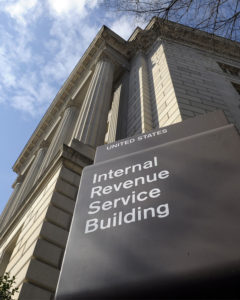You can defend yourself against these scammers by knowing these simple rules:
Rule 1: Expect a letter first
In almost every case, the IRS will send you a letter via standard mail if they need to get in touch with you. This will alert you to expect future communication from the agency and instruct you on the best ways to get in touch with them.
What to do: If you get a letter from the IRS that is unexpected or suspicious, it should have a form or notice number searchable on the IRS website, www.irs.gov. If something doesn’t look right, you can call the IRS help desk at 1-800-829-1040 to question it.
Rule 2: Never over email
The IRS will never initiate contact with you using email. A common scammer trick is to send emails to taxpayers using accounts and graphics that imitate the agency’s. They may threaten imprisonment or fines if you don’t pay up, or promise an extra refund if you send money to “prepay” your taxes. Often the emails contain links to an official-looking fake website to collect payments. Clicking on them may also trigger the installation of virus programs on your computer.
What to do: Don’t respond to any email communications supposedly from the IRS. Don’t click on any links. Delete the email or forward it to phishing@irs.gov to help catch the scammers.
Rule 3: Proper phone call etiquette
After notification via the USPS, the real IRS may call you to discuss options to handle delinquent taxes or an audit. A real IRS agent or a debt collector won’t demand immediate payment without giving you an opportunity to question or appeal the bill. Nor will they threaten lawsuits, arrest or deportation. Their tone should not be hostile or insulting. Finally, if they ask for payment, they should be asking you to make it out only to the United States Treasury.
What to do: If you get a call from the IRS or an IRS debt collector, politely ask for the employee’s name, badge number and phone number. They shouldn’t hesitate to provide this information. You should then end the call and dial the IRS at 1-800-366-4484 to confirm the person’s identity.
Rule 4: Check in-person visits
Ask the person for their credentials. Every IRS agent should be able to produce two forms of credentials: a pocket commission card and a personal identity verification card issued by the Department of Homeland Security, also called an HSPD-12.
What to do: Never provide sensitive information nor confirm information they may have without first independently verifying they are legitimate representatives of the IRS. If you have concerns you can call the IRS at 1-800-366-4484 to confirm the person’s identity.
You do not need to navigate this problem on your own. Call immediately for assistance. It is good to have a knowledgeable expert on your side.
Cordero CPA MIΔMI
305.599.4111
.
Cordero CPA. KISSIMMEE
407.931.0002
.

